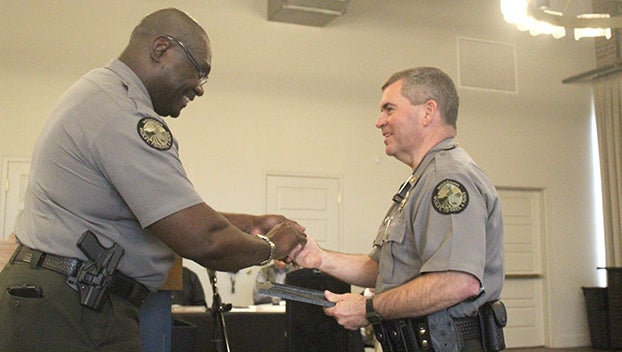Brookhaven readies for classes
Published 9:49 pm Friday, July 28, 2017

- Photo by Donna Campbell/Sandra White shops for supplies with her granddaughter, Rachel White, who will be starting fourth grade at Brookhaven Elementary Friday.
Ray Carlock has seen the future and it will be filling some 3,000 seats in Brookhaven schools Friday.
Carlock, superintendent for the Brookhaven School District, is eager for classes to begin so students can get busy learning and preparing for graduation, whether it’s one year away or 13.
“We’re definitely looking forward to a new year,” said Carlock, who is entering his second year as the district’s top boss.
Carlock said administrators have spent the summer break working on curriculum.
“We’re looking at improving lesson plans in the classroom, making sure everything is aligned with (the state’s) college and career readiness standards,” he said. “We’re trying to move into a positive direction.”
The Mississippi Department of Education has been increasing the rigor in instruction and testing because students aren’t just competing with their classmates around the state for jobs in the future, they’ll be competing with students across the country and the world.
In an effort to set higher expectations to yield higher achievement, education leaders across the state improved academic content standards. In 2015, the MDE received and incorporated feedback from Mississippi educators, parents, as well as business and community members regarding Mississippi’s standards. MDE reports 91 percent of teachers and 96 percent of school administrators who reviewed the standards approved of them.
Carlock said it is paramount to the students’ success in the school district to have support from home.
That’s why one change this year is the reintroduction of “report card pick-up” days at the end of the first- and third-nine weeks. It’s something the district did in the past, and Carlock is bringing it back.
“It’s to make sure that everybody knows what’s going on,” he said. “Parents can come and look at the report cards and talk to the teacher.”
That gets them more involved in classroom activities.
“We’re looking at it as another way for us to communicate with parents and making sure we’re all on the same page,” he said. “Research has shown that parents who are involved in their students’ school life, the outcomes are better.”
The U.S. Department of Education in “Parent Power: Build the Bridge to Success” offers the following suggestion for parents who want to take an active role in their children’s school lives:
• Be responsible. Accept your role as the parent and make education a priority in your home.
• Be committed. Once you have begun to work with your child, continue doing so throughout the year.
• Be positive. Praise goes a long way with children, especially with those who struggle in school. Provide positive feedback.
• Be patient. Show your child that you care through your commitment and encouragement.
• Be attentive. Stop your child immediately when bad behavior appears. Show him or her what to do and provide an opportunity to do it correctly. Discipline should be appropriate and consistent.
• Be precise. Provide clear and direct instructions.
• Be mindful of mistakes. Record your child’s performance. Look over all the work your child brings home from school and keep it in a folder. Help him or her correct any errors.
• Be results-oriented. Gather information on how your child is performing in school. Keep notes of conferences with teachers, request progress reports and carefully read report cards and achievement test results. Ask questions about these results.
• Be diligent. Work from the beginning to the end of the year with your child and the teacher.
• Be innovative. Keep learning lively and dynamic.
• Be there. Just be there for your child–to answer questions, to listen, to give advice, to encourage and to speak positively about his or her life. Be there to support your child whenever needed.
The state Department of Education is also giving parents a chance to weigh-in on a proposal that would give students the opportunity to earn an endorsement with their high school diploma and would ensure that the majority of students with disabilities earn a traditional diploma. The proposal follows a statewide effort to increase college and career opportunities for all students and a new state law that eliminates the Mississippi Occupational Diploma option for students with disabilities starting with freshmen entering high school in the 2017-18 school year.
“The proposed diploma options will give students more opportunities to demonstrate their strengths and achievements and will clearly communicate that they are well equipped for their next stage in life,” said Dr. Carey Wright, state superintendent of education, in a statement to the media. “These options will provide all students, including students with disabilities, with meaningful opportunities to succeed.”
The proposed diploma options would take effect in the 2018-19 school year. Students entering grades 10, 11 and 12 in the 2017-18 school year who are currently in a course of study that leads to the MOD option must get parental permission to remain on the MOD track. Otherwise, their Individualized Education Program team would be encouraged to consider a course of study that leads to a traditional diploma.
The traditional diploma will require all students graduating from Mississippi high schools to have the same basic requirements and to earn 24 Carnegie Units. After meeting the traditional diploma requirements, students can take additional CTE coursework to meet the requirements for the CTE endorsement or advanced, college-preparation coursework to earn an academic or distinguished academic endorsement. The CTE and academic endorsements require students to earn 26 Carnegie Units. Students must earn 28 Carnegie Units to qualify for the distinguished academic endorsement.
“The diploma endorsement options will encourage students take advantage of their senior year in high school to earn a credential that will benefit them in college, postsecondary training or the workforce,” Wright said.
The alternate diploma is designed for the approximately 1 percent of students who have met the criteria on their IEP for having a significant cognitive disability. This diploma requires students earn 24 credits in an alternate course of study. The alternate diploma is not equivalent to the traditional high school diploma and is not recognized by postsecondary entities that require a high school diploma. However, the alternate diploma certifies that a student with a significant cognitive disability has successfully completed a course of study aligned to academic standards.
“The proposed diploma options will ensure that the vast majority of Mississippi’s students are getting the instruction they need to earn a traditional high school diploma. Our students deserve the opportunity to graduate with a diploma that is recognized by employers, postsecondary institutions, the military and colleges and universities,” Wright said.
Oral proceedings are scheduled on Aug. 22 at 6 p.m. and Aug. 24 at 2 p.m. at the auditorium at the Central High School Building at 359 N. West St. in Jackson.
Written comments can be submitted to Jo Ann Malone in the Office of Accreditation at accreditation@mdek12.org. All comments must be received in Malone’s office by 5 p.m. Aug. 31. Comments will be presented to the board Sept. 14.





